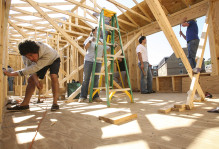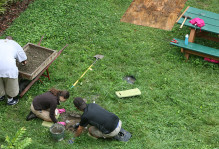First, do no harm?
SOMOS and MANOS began in part in response to enthusiastic developments in higher education that suggested a happy confluence among the following: the energy and optimism of undergraduates, communities and other localities willing (or unable to be unwilling) to accept volunteers, and the prospects that such excursions and incursions might have some value for either local residents, students, or both. The founding members of both projects were suspicious of some of the prospects but perhaps only a little less infused with the cultural moment and its promise that their education and privilege might be resources for making a better world.
For nearly a decade now, students have competed for selection to the projects, participated in seminars each semester, travelled to the Dominican Republic or Nicaragua (some have gone to both), learned basic research skills, contributed to a developing model of participatory development and public health, attempted to understand the value of knowledge for partnering with a community to promote improved health and health care – and worried: Do we have the right to be here? However unintentionally, are we continuing patterns of first-world domination? Are we taking risks with people, their cultures, or their communities?
I want to be clear that I am expressing my own views. This is not a summary of the considered opinions of my very able colleagues on the projects and it may not express the opinion of any member of either team.
In the latest round of self-examination (SOMOS seminar 9/25/14), team members questioned the constraining effects of what we had been thinking of as the “unconditional gift” with which we began the project – the clinic. Perhaps offering that “gift” was itself an imposition of our values rather than a simple, beneficent act? Perhaps we have deceived our would-be partners from the beginning, by our action asserting our privilege, our authority, or our capability for “helping” them?
In earlier versions of these essential self-exams, we have sought some ethical foundation and, perhaps in part because of our affiliation with a medical brigade clinic, we have thought of the popularly assumed standard of medical practice: First do no harm (which, apparently, isn’t actually part of the Hippocratic Oath and likely is not the actual standard of medical responsibility; but more on that later). Our version of “do no harm” has been to take responsibility for engaging relevant systematic knowledge as the foundation for entering into the community and for building partnerships with them. At its worst, the strategy can be an empty critique of other projects and people who wander into communities with little preparation and less knowledge about historical, political, economic, cultural, and local realities. At its best and in the context of undergraduate engaged scholarship for credit, the strategy offers the following:
- prospects for continuity
- unevenly prepared participants, with experienced team members graduating and new team members joining the work
- reliance on diverse and uneven research and theoretical literatures across multiple disciplines and fields (sociology, anthropology, cultural studies, community studies, international development, and public health, among others) and through all of these:
↓
- The prospect for offering support to community efforts through reading, interpreting, and applying accumulating knowledge.
It does not follow that the best is good enough. The “do no harm” criterion may not be the appropriate standard either for medical practice or for ambitious undergraduate projects in engaged scholarship, but it ought not to be disregarded. I want to relate a recent personal experience in order to examine the do-no-harm premise.
My 87-year-old father recently was hospitalized for de-hydration accompanying a stomach ailment. In the course of his stay, his pacemaker/defibrillator activated in response to ventricular fibrillation. A review of the device revealed that there had been a few other, less severe episodes. A cardiologist consulted with my father and recommended a nuclear stress test, followed by angiogram and stenting if indicated. Making hospital rounds the next day, a second cardiologist consulted and raised questions about the risks of the stress test and the value of the angiogram. On the third day (not intended as Biblical here), a third cardiologist consulted and concluded that there might be some benefit to angiogram (the nuclear stress test had been done) and that the risks of the procedure could be reduced by not anticipating stenting at the time of initial procedure.
For context: My father was in hospice care more than a decade ago with a life-expectancy of less than a year. He had a “massive heart failure,” which destroyed more than 70% of his heart. With some insistence, we got Dad out of hospice care by persisting in asking about a pacemaker/defibrillator and he has worked about 30 hours a week for the past decade.
What standard guided the cardiologists? We were advised that each of the suggested procedures carried risks for a patient like Dad: detrimental effects on kidney functioning, the risk of bleeding (which could be uncontrollable), and stroke. We were advised that the procedures would have no better than a “50/50” prospect for providing any benefit. One of the docs was most explicit: it’s a “risk/benefits” calculus that we need to consider. The decision was to proceed with angiogram, which revealed that nothing of benefit could be done.
It appears that the operant standard here is some knowledge- and practice-based risk/benefits calculus. In fairness, my review of some medical ethics literature revealed also an abstract ethical commitment to have the “utmost respect for human life from its beginning.”
It may be that we’re looking in the wrong place for ethics, that we should look to science or some other field of work. There is a “Hippocratic Oath” for scientists. It seems relevant, but it stops short of issues concerning the use of knowledge. There are ethical standards for public health practice, and these are suggestive but seem to stop short of concerns raised by students in SOMOS and MANOS. Here are some key principles:
- Public health should achieve community health in a way that respects the rights of individuals in the community.
- Public health policies, programs, and priorities should be developed and evaluated through processes that ensure an opportunity for input from community members.
- Public health should advocate and work for the empowerment of disenfranchised community members, aiming to ensure that the basic resources and conditions necessary for health are accessible to all.
- Public health institutions should provide communities with the information they have that is needed for decisions on policies or programs and should obtain the community’s consent for their implementation.
For me, there are two significant concerns: (1) the envisioned role of the community is far too passive; (2) the principles presume an extant community with capacity, for example to use information and to provide consent.
I hope each of us on the SOMOS and MANOS team will consider the ethical issues that concern us individually and collectively and that we will be challenged to decide on a continuing and regular basis whether or not we are engaged in efforts that are morally defensible. In addition, I will begin efforts that should have started earlier to challenge myself and my colleagues to articulate a code of ethics that we believe addresses central concerns of our ongoing work. I don’t know what principles will result, but here are some that I believe may be strong candidates:
- We will respect the rights of self-determination of individuals, groups, and communities.
- We will hold paramount the safety, health and welfare of the public, the protection of the environment and the promotion of health and safety (from the Code of Ethics of Technology Professionals (pdf))
- We will respect “health, human potential, empowerment, growth and excellence – people being healthy, aware of the fullness of their potential, recognizing their power to bring that potential into being, growing into it, living it, and, generally, doing the best they can with it, individually and collectively;” (from the Code of Ethics of International Organization Development)
- Research:
- We will undertake research in support of partnering with communities in ways that invite direct participation from residents.
- We will ensure that all research is competent, consistent with professional and disciplinary standards, and shared with residents.
- We will ensure that residents participate in the interpretation of findings and their implications for ongoing partnering efforts.
Even in the face of the proposed investigations, there will be unanswered questions about the unintended consequences of inviting ourselves into other people’s lives. I believe that we will continue to worry about these and that we should.




No comments.
Comments are currently closed. Comments are closed on all posts older than one year, and for those in our archive.